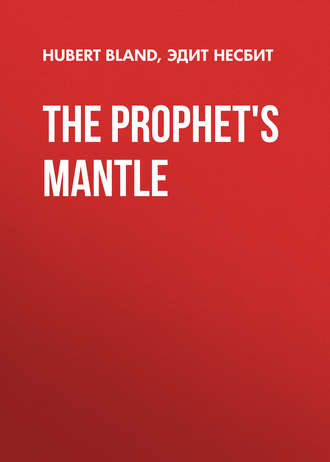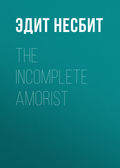
Эдит Несбит
The Prophet's Mantle
'That's all very well,' said Mrs Toomey; 'but what's to become of example if the good and the bad gets treated alike?'
'It isn't that; what I want is to give the bad—who is not so very bad in this case—a chance of being better.'
But she was not silenced. She ran over the whole scale of objections, moral and conventional, to his proposition, and to each and all of them he found an answer, and sat there quietly persistent, until at last he drove her back upon 'What will people say?'
'As far as I'm concerned they can say what they like, but if you care about people's opinion, it is easy to guard yourself against it by telling them nothing. No one would know more than you chose to tell them.'
'That's honest, isn't it?' asked Mrs Toomey, patting the baby, who was choking himself with his fist.
'Well, honesty doesn't consist in publishing other people's affairs to all your neighbourhood. And, my good Mrs Toomey, don't you see that the very fact of her being in your house would stop questions?'
'I'm no hand at arguing,' said Mrs Toomey at last, 'but I know you've some sense, sir, and I don't think you'd press a thing like this without there was some rhyme or reason in it; but the most I can say is, me and Toomey'll talk it over; but the truth is, I've never had nothing to say to that sort o' girls, and I don't like to begin at this time o' day. And even if my man agrees, I won't promise about it until I've seen the young woman, for what's the good of Providence giving us common sense if we're not to put it to use, instead of trusting to hearsay and other people.'
'Quite right; that's a first-rate principle. If all the world would think like that we should see some changes. I will tell her you have a room to let, and advise her to apply for it, and then you can see her and act as you choose. But I feel sure beforehand how it will be.'
And as he bade her good-bye he did feel quite sure that he had not spent that half-hour in vain.
'I really feel like a City missionary, or a newspaper correspondent, after all these interviews. Now for the last and most interesting.'
But when he reached Mrs Litvinoff's room he found her out. There was no answer to his repeated knocks, so at last, as the key was in the door, he opened it, almost fearing to find her in another of those fainting fits. But the room was empty. He hesitated a moment, and then entered. It wanted a few minutes to noon; he would wait till the appointed time, and while he waited he wondered, as he had been wondering all the morning, why she had taken this name of Litvinoff. Was it simply because Litvinoff had been the first name that had come into her head, or for some deeper or more important reason?
The room was very neat, and did not offer much entertainment to the eye or employment to the mind; but there were four or five books on the mantelpiece, and he was drawn towards them by a natural attraction. It was one of his habits always to take up a book, if one was within reach. They were very nicely bound, he noticed, except two small volumes at the end of the row, in which he smiled rather sadly to recognise a Bible and Prayer Book. He ran over the titles—one or two novels, 'The Children's Garland,' 'Mrs Hemans,' and, strange accompaniment, Swinburne's 'Songs before Sunrise.'
He took it out and opened it. On the first page was written, 'To Alice, from Litvinoff.'
He stood looking at it fixedly—so absorbed that he did not hear Alice's foot on the stairs, nor notice the rustle of her dress in the room, till she said,—
'Have you been here long? I am so sorry I had to run out for some thread for my work. I thought I should have been back before.'
She was a little out of breath with running upstairs, and a little flushed, too. He now saw that she was prettier than he had thought, but he also saw more plainly the hollows in her cheeks and the dark circles round her eyes.
'I must make a confession,' he began at once, turning to her with the book in his hand. 'I have asked myself, was it chance made you take this name of Litvinoff? But I see now you have a right to it.'
She turned her head and looked towards the window in silence for a moment. Then she said,—
'I do not know that I have a right to any name except the one I was born to; but if I have a right to any it is to the one written there.' It was said slowly and with evident effort. She threw her bonnet on the table, leaned her elbows on the window-ledge, and looked out.
'Won't you sit down?' she asked, after a minute, without looking round.
He took a chair, and said, 'Then it wasn't only for the lecture you went to Soho?'
'No.'
'See here, Mrs Litvinoff; I know the Count, and I and others are much interested in his career. I wish you to believe that I would not ask you questions from idle curiosity. His own welfare depends to a great extent on what we may hear of him.'
'I have nothing but good to tell you of him.'
'But, madam—forgive me—how about last night? He has deserted you?'
'No,' said she, steadily; 'don't make any mistake. I left him. He was never anything but good to me.'
'You are not married to him?'
'Don't ask me any more questions,' said Alice. 'I can't tell you anything.'
'Mrs Litvinoff,' said Petrovitch, very gently and very gravely, 'I beg you for his sake to tell me all you can of him. You know the sort of dangers run by a man in such a position as his; and from many of these dangers we can help to screen him. I am a friend to all who are friends of Litvinoff. Think of me not as a man and a stranger, but as the friend of him, and tell me frankly all there is to tell.'
It was characteristic of the man who spoke that he should be able to make an appeal which would move this girl, who had not known him twenty-four hours, to tell him all that she had felt it to be impossible to tell her foster-brother, Richard Ferrier. For she did tell him.
The substance of her story was this: She had been staying with an aunt who kept a small hotel in Liverpool, when she had met Litvinoff, and had seen a great deal of him. He had seemed to her to be different from all the other men she had ever seen, and though she could not help being pleased by his admiration, she had felt that the difference in their station was such that she could not properly fill the position of his wife. His grave and respectful manner and the perfect deference with which he always treated her had made it impossible for her to suppose that his wish was other than to make her his wife. So, though all her inclinations would have kept her in Liverpool, she had, after a severe struggle with herself, shortened her visit, and returned to Derbyshire without bidding him good-bye.
He had followed her, and one evening when she was walking alone she had met him. Of course, there had been explanations. He had implored her not to send him away—to let him be always as happy as he had been that month at Liverpool. He met her objections as to the difference in their position by telling her that he was an outcast and an exile, and had no position. Would she not make his hard life a little easier to him? At every word he said she felt her resolutions melting away; but her parents, would they ever consent to her marriage with one who held such opinions as his?
Then he had told her gravely and tenderly that he was at war with society and with most of its conventions, and that for him to marry in the ordinary sense of the word would be to compromise and deny every principle on which his life was founded. The true marriage, he had maintained, was fidelity, and mutual love was more binding than could be a ceremony in which one of the performers did not believe. He loved her he had said, far too dearly to wish to deceive her in the smallest degree about his sentiments, and so he felt bound to tell her that to him a legal marriage would be for ever impossible. In spite of that, would she not be noble enough to trust her life entirely to him, and be his wife?
This had been so completely unexpected as to be a great shock to her, and she had felt at once that, however she might decide, it would be out of the question to tell or ask her parents about it. Her choice lay between them and her lover. We know how she chose.
Of her time of happiness she said very little, but her hearer gathered that, though Litvinoff had left her much alone, she had had no reason to doubt that he still cared for her.
But the influence of her early training, though it had sunk into abeyance in the hour of strong temptation, had slowly and surely reasserted itself as the months went by. She had striven still to believe that she was acting rightly, but at last it became impossible to her to persuade herself that she had any right to be a law unto herself. So at last she had left her lover, with no farewell but a letter, in which she had tried to tell him how it was. She had felt a pleasure in the hardness of the life that followed—had vaguely felt it to be in some sort an expiation of her wickedness.
'You see,' she ended, 'if I had believed as he did, perhaps I should have been right to act as I did; but I believed in all the things that he denies, and so I was wrong to dare to take his views of good and bad for me, while all the time I kept my own old thoughts of what was really good and bad. I can't explain myself well, but you see what I mean—don't you?'
'Yes,' answered Petrovitch, rising; 'I see that another life has been sacrificed upon the altar of an abstraction. If it gives you happiness to give yourself pain, at anyrate I should think your wickedness, as you call it, was expiated now. Has he never tried to find you out?'
'He may have tried,' said Alice, 'but he has not succeeded.'
'Would you not go back to him—now that you have another life than your own to think of?'
Alice darted a quick glance at him, and turned very white.
'No, unless that happened which never can happen—if his belief changed. But I cannot go on talking like this; it is torture to me—and to what end?'
'I told you—for his good and yours. However, to business. Of course, since you have undertaken that tailor's work you must finish it; but after, I will get you work better paid. And this room—you do not like it? Mrs Toomey has a room to let, and I am sure she will like to have you for a lodger. Will you go there and see it, and if you like it move there? I will lend you money for moving and for present expenses, and you can pay me when you settle to work again.'
'But why,' asked Alice, half turning round to look at him, 'why are you so kind? Why do you help me so?'
'I help you,' he answered, laying some money on the table, 'because to me you are truly Litvinoff's wife, and I am the true friend of all who are friends of him.'
Alice knocked at Mrs Toomey's door about three o'clock that afternoon. Mrs Toomey, her baby in her arms, and an air of reserving judgment about her, showed the room she had to let, which was convenient and exquisitely clean.
Alice followed her into the parlour afterwards.
'I think it only fair to tell you,' she began confusedly, 'that I am not really Mrs Litvinoff—but—'
The other interrupted her.
'I know all about it,' she said, bluntly, 'and now I've seen you—'specially as you were going to tell me, so honest and fair—I'm sure we shall get on very well. And no one sha'n't ever know anything from me, and let bygones be bygones betwixt us. If you'd like to move in at once, why do, and come and have a cup o' tea with me when you've fetched your things.'
There was no mistaking the cordiality which had replaced Mrs Toomey's half distrust as soon as she saw that her would-be lodger had no intention of coming there under false pretences.
And so, a few hours later, Alice had effected her moving, taken possession of her room, and was sitting by Mrs Toomey's spotless hearth, with her feet on the brilliant steel fender, her face brighter than it had been for many a long day, while the children stared at her with wide but friendly eyes, and Mrs Toomey's baby lay contentedly on her lap.
The day had been at its beginning so wild, so bitter, so full of horrible possibilities; this was a peaceful—almost a happy—ending to it. Alice felt the change keenly, and there was gratitude to Petrovitch in every word she spoke to the mother, every smile she gave to the little ones.
CHAPTER XIV.
A PEACEMAKER
ON the morning after that which he had spent in the study of Art, Count Litvinoff was busily engaged in turning out the pockets of coats, and 'making hay' of the contents of portmanteaus, conducting a vigorous search for something or other, and singing softly to himself the while,—
'Oh, 'tis love, 'tis love, 'tis love, that makes the world go round;
Every day beneath his sway fools old and young are found.
'Tis love, 'tis love that makes the world go round.'
'It may do that,' he said, dropping suddenly into prose, 'but it doesn't find missing property. I shall have to buy one, which will be annoying, when that one has been kicking about ever since I came from Liverpool. Ah! here it is. I've saved at least four and sixpence, which to a man in my delicate position is a largish sum. For, after all, you can't insult a man by pursuing him about London with a cigar-case that cost less.'
He opened the little crocodile-skin trifle and looked into it.
'It has been used as a letter-case before now, and it would rather complicate matters if I left one of somebody's notes sticking in the lining. Things are a little bit that way as it is. The world is very, very small. A remark, by the way, which is invariably made by people who have more than one creditor. But it is strange that I should have run right into the midst of this Ferrier set. One would think that there was only one county in England, and that was Derbyshire.'
He sighed a little, but brightened as his eye fell on the chair which Roland had occupied two nights before. His voice took up the song again as he returned his belongings to something like order. He had just made his sitting-room presentable again when the waiter appeared, and offered, with an air of virtuous and respectful protest, a folded piece of paper, which had been white once, but since that time had apparently sojourned in the pockets of one who carried his meals about with him.
'Seductive billet-doux,' said Litvinoff, as he took it. 'Is it by chance a tinker's bill?'
'It was brought, sir,' said the waiter, 'by a man who appears to be a foreigner. He said he'd wait for an answer.'
'Show that distinguished gentleman up.'
While his order was being obeyed, Litvinoff looked at the paper again. It was not a letter or a bill, after all; but seemed intended to answer the purpose of a visiting card, for all that was written on it was 'Johann Hirsch.'
Litvinoff was not altogether unaccustomed to being called upon by foreign gentlemen with bold and original views on the subject of visiting-cards. He never refused to see any of these visitors, and always sent them away charmed with the beauty of his sentiments and the liberality of his intentions, and occasionally with something more substantial.
As the waiter closed the door and retreated with a glance of politely veiled contempt, the man whom he had shown in came forward, and Litvinoff recognised in him at once the person who had been so interested in the 'Prophetic Vision' on Sunday evening. He offered the visitor his hand with sunny cordiality.
'I am delighted to see you. I have not forgotten your kind interest in my lecture at the Agora. Please take that arm-chair.'
The other did so.
'I speak English not well,' he began. 'Perhaps the Herr Count speaks German?'
'Certainly,' he replied, in that language; 'but to my friends I am not Count, but Citizen Litvinoff.'
'I cannot claim to be a friend of yours,' said the other, who seemed to speak under the influence of some constraint; 'but I am a friend to the cause you advocate. I do not come to you for myself, but to ask you to help another, who is in sore trouble and distress.'
'I am very sorry. Who is he?'
'It is a woman. The wife of an exile, one of us, separated from her husband by circumstances I may not tell of, but which are not to the discredit of either.'
'What is her name?' asked Litvinoff, a shade more interested than if it had been the exiled husband who needed relief.
'I don't know her name,' said Hirsch; 'but she is very poor and very proud, and I am afraid very ill.'
'Unfortunate combination,' muttered the Count, below his breath, in English.
'But, my good friend Hirsch, how do you propose to give money to this distressed lady, whose name you do not even know?'
'There is only one from whom she will take it, and from him I come. He will give it to her. You will have no credit for your generosity, citizen, for she will not know from whom it comes.'
'I don't think credit is what we work for, nous autres,' said the Count, with a slightly injured air.
'I must tell you the truth,' answered the Austrian, with a shrug of his shoulders and an outward gesture of the palms of his hands.
'Doubtless; but may I not know the name of the benefactor from whose assistance this lady's pride does not shrink?'
'Assuredly; he told me that if I mentioned his name to you, it would be enough to guarantee your attention.'
A very slight change passed over the Count's face, and yet there seemed nothing in that speech to stir up uneasiness. The expression was so transient that it escaped the sharp eyes that watched him from under Hirsch's shaggy eyebrows.
'Distress itself is the best guarantee for my attention.'
He rose and unlocked a despatch box and took out a cheque-book.
As he took up a pen and sat down he asked,—
'What is our friend's name?'
'His name is Petrovitch. You knew him in Russia, I believe.'
'I have heard much of him lately in London, but I have never been so fortunate as to meet him here.'
'He was with me at the Agora on Sunday.'
Litvinoff looked up pleasantly from the cheque he had been filling in.
'Ah, so,' he said, 'I wonder he could not have answered you about the pamphlet.'
'He could have done,' said the other rather grimly, 'if I had thought of asking him, but I did not think of doing so.'
'Well, I must hope soon to meet Citizen Petrovitch. In the meantime give him this, with my best hopes for the welfare of his lady friend. I wish it may be useful, small though it is.'
'There's no doubt about that,' said Hirsch, rising as the other held out the cheque, and glancing at the two figures on it, before folding it very small and concealing it in an inner part of his nondescript garments.
'By the way,' said Litvinoff, 'I've made that out to Petrovitch's order, as I did not know the lady's name.'
'It is better so perhaps,' said Hirsch. 'Good day.'
'Do not go yet,' said the other, hospitably; 'won't you stay and have some lunch?'
'Thank you, no; I have eaten.'
'Well, at anyrate, you'll have a glass of wine, won't you?'
'I am not thirsty, I thank you; good day.'
'Good day,' said the Count, shaking hands cordially. As the door closed behind the other he sank into an arm-chair.
'What an exceedingly fatiguing person. He chooses amiable and courteous messengers, this Petrovitch. I wonder if I did know him in Russia. My memories of childhood's hour are singularly confused, but it's impossible to remember everybody, that's one comfort. It is remarkable how well people remember me, when there's anything to be got by it. This princely drawing of cheques, however, will come to an abrupt termination shortly, and then—I wonder exactly how long it will be before I send in my name to people on dirty bits of paper as a preface to requests for cheques for destitute lady friends?'
He deftly rolled a cigarette, lighted it, and then said, musingly,—
'That property in Volhynia, would it be possible—By heaven, it would be a gallant attempt—it would be almost genius. As a forlorn hope it would be sublime; but I have still some hopes that are not forlorn, and the position of an English landowner is not unenviable. It would at anyrate enable one to give cheques with a freer hand to any mysterious stranger with dirty linen whose anonymous lady friends may happen to be hard up. Hullo, my friend!'—as his eye fell on the cigar-case—'I'd almost forgotten you. I suppose I must be about my business. There are very few men, I am convinced, who work as hard for "the daily crust" as I do.' He flung the end of his cigarette in the fire, and put on his coat.
'And now,' he said, taking up his hat, 'to seek the Midland Hotel, and face whichever Ferrier the Fates may send me. Probably I shall have my walk for nothing; they will be engaged in business, these interesting victims of a misunderstanding which I so deeply deplore.'
He smiled hopefully at himself in the glass, and went out.
'Is Mr Ferrier in?' he asked, when he reached the Midland Hotel, and the answer being 'Yes,' he turned into the coffee-room to wait, still uncertain as to which brother he should see.
It was Richard who came down to him after a few minutes—Richard, whose face, ulster, and soft hat all seemed to be of the same shade of drab.
'Good morning, Count Litvinoff,' he said; 'can I be of any service to you?'
'It was your brother I wished to see,' said the Count. 'He did me the honour to spend a few moments at my rooms last night, and I think this must be his. May I trouble you to give it to him?'
Here he produced the cigar-case.
'I don't think it belongs to my brother,' said Richard, 'and I'm sorry I can't do anything in the matter; but I sha'n't see him again.'
'Ah! you are leaving London?'
'I'm leaving this hotel.'
'Well, perhaps you are right to seek one more cheerfully placed. You are not looking well; perhaps this situation depresses you?'
'Oh, I'm all right, thanks. I'm rather glad you happened to call, because I shall perhaps not see you again. I'm afraid I was rather uncivil yesterday, and, if so, I'm sorry: I didn't intend it, but it struck me afterwards that it might seem so to you. The fact is, I was horribly put out about something.'
'Oh, don't mention it. I saw then that you were annoyed about something, and now I know what it was. I know enough of English manners, Mr Ferrier, to know that here a stranger's interference in personal or family matters is the unpardonable sin. But my faith, you know, compels me to set aside conventions that are only conventions, and to try to give help wherever help can be given.
'I am so complete a stranger,' he went on, regardless of a slight movement of impatience from the other, 'so utterly, so palpably disinterested, that I hope I may without offence say to you what I intended to say to Mr Roland.'
'I don't see that anything could be said to my brother without offence that could not equally well be said to me.'
'This, then, is what I would ask. Is there anything I can do to effect a reconciliation between you and your brother, and prevent this breach from growing wider?'
'I had never told you that there was any breach,' Richard said stiffly.
'No,' he said, 'but all others have not your powers of reticence.'
'I presume my brother has been confiding in you.'
'Your brother told me—what perhaps his pride forbade him to tell you—that you had accused him of something of which he assured me he was as innocent as—as I am,' ended Litvinoff, raising his eyebrows ingenuously.
Richard's first impulse was to request the Count to mind his own business, but he remembered that the interferer was a foreigner, and besides, Litvinoff's manner was so honest, and what he said was true enough. He certainly must be disinterested. So he constrained himself to say, with very little change of manner,—
'If my brother wishes to disprove any charges I may bring, he'd better disprove them to me.'
'But are you quite sure that you were not mistaken? May not your feelings on another matter have predisposed you to believe without evidence enough in this?'
'I quite fail to understand,' said Richard, frowning.
'Is it not possible that you may have thought of him less as your brother than as your rival?'
'If you have anything more to say that needs saying, I shall be glad if you will say it plainly.' Richard spoke angrily.
'Plainly, then—you also are a suitor for the hand of Miss Stanley?'
Ferrier's hand clenched itself, and then made a little movement which seemed quite involuntary. The blood rushed to his face as he spoke.
'May I ask who gave you that piece of false information?'
'Certainly you may ask,' answered Litvinoff, smiling very sweetly. Other people's tempers did not seem to affect him much. 'You may ask, but I—I must not reply.'
'It is lucky that I don't need your answer. There's only one person who would have told you such a lie, and for the future you'd better keep your interference for him, as he seems to like it.'
'And you, perhaps you'd better keep your insolence for those who'll stand it,' said Litvinoff, with the same gentle smile. 'Perhaps our next meeting may be in a country where it is customary to avenge insults in some other way than what you call, I think, a rough-and-tumble fight. Au revoir!'
'You don't seem to find other countries very anxious to have you, since you have had to run away from one at least,' said Richard passionately.
'Oh, delicacy and nobility of English chivalry!' said the Count, turning at the door to favour the other with one last smile. 'How unfortunate for Miss Stanley that you at least are impossible. Pouf! The bourgeoisie is the same, all the world over!'
He lingered in the hall to make himself a cigarette, half expecting Richard to follow him, but as he did not, strolled slowly away into the street.
Richard remained standing in the coffee-room with one hand on the table by which the conversation had taken place.
He felt indignantly injured by Litvinoff's interference, and in the first moments of passion felt sure that his interference had not been disinterested. But as he grew calmer, and was able to think the matter out quietly, he could not suggest to himself any possible reason for the Count's wishing to adjust the quarrel between himself and Roland, except the one he had given. Yet, even if the Russian had been merely filling the rôle of 'friend of humanity,' Dick felt glad that he had shown resentment. One might overlook intermeddling which had its rise in an overpowering interest in one's own personality; but when one was included merely in a vast aggregate like humanity, the compliment which might have been as salt to over-officiousness did not exist, and the conduct of the Count became simply offensive. But, after all, most of his resentment was levelled at the man who had put this weapon into the Russian's hands. Had his brother completely lost all sense of honour—of decency even—that he should thus make him, Richard, the subject of confidence with a stranger? And such confidences, too; confidences that hinged on her name.
'But why should I expect anything better from him, after his conduct to that poor child?'
Then he thought of all he fancied he had discovered about Alice, and all the little things that had aggravated the quarrel with Roland. All the substance of the quarrel would not, perhaps, seem insurmountable if it were written here in detail, but to Richard and his brother these things appeared in far other proportions. The mutual jealousy and distrust that had been growing up between them in the past months was as so much dry tinder ready to catch fire at any spark of a pretext for anger which either might have lighted on.
And this case of Alice was something more than a trifling pretext. Richard himself was neither an angel nor a monk, but at least he played the game of life according to the rules. And, consequently, he felt towards his brother much as an old écarté player might towards a man who kept kings up his sleeve.
He decided to spend a few more hours in the search for Alice, which, hitherto unavailing, he had kept up for the last two days, and then he would go down home and see Gates, and Roland would have his wish. The same roof should not cover them again.







